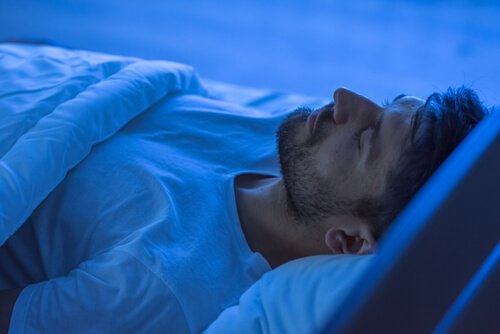What Happens When You Sleep

What happens when you sleep? Your body gets its basic needs met and this promotes and maintains a healthy metabolic-organic balance. If the proper schedule for quality sleeping isn’t respected, it can lead to serious health problems in the long run.
Rest is an important and determining factor for the welfare of the entire organism. When we sleep, not only is the whole body recovered and restored, but the fundamental levels of energy are also restored.
The amount of hours a person needs to sleep varies depending on their activity and lifestyle. Further, adults should ideally sleep between seven and eight hours a day. According to the National Heart, Lung and Blood Institute (NHLBI), consistently sleeping poorly increases the risk of high blood pressure, heart disease, and other medical conditions.
What happens when you sleep: sleeping stages
There are two sleeping phases: NREM (non-rapid eye movement) and REM (rapid eye movement). Also, sleeping is divided into 90-minute cycles, alternating between NREM and REM cycles. There are five of these cycles per night. Specifically, the NREM phase, also known as quiescent sleep, has three stages (formerly four).
The NHLBI states that thanks to recent sleeping studies, we now know that these stages move cyclically throughout the night. The brain remains active during sleep; however, different things happen during each stage.
“I love sleep. My life has the tendency to fall apart when I’m awake, you know?”

What happens when you sleep: quiescent sleep
Relaxed wakefulness
This is the initial sleeping stage that may last between five to ten minutes because it’s still easy to wake up. All the muscles throughout the body are relaxed and the brain activity decreased.
Beginning of sleep
In this second stage, body temperature and heart rate decrease significantly. This is the stage in which the body prepares to move to a night of deep sleep and there’s a decrease in brain and muscle activity.
Slow wave sleep
This is the third stage (it includes the former fourth stage) which is characterized by deep sleep from which it’s more difficult to wake up. In addition, brain and muscle activity decrease significantly. During this stage, the body is in charge of repairing tissues; building muscles and bones; as well as helping strengthen the immune system.
REM phase
During this phase, characterized by the rapid movement of the eyes, dreams occur. Then the brain activity is fast, there is a paralysis of the muscles, the heart rate in addition to breathing accelerates and you can have extremely intense dreams.
Approximately, 90 minutes after having reconciled the sleep, the REM stage takes place, which lasts about ten minutes. As the hours go by, the REM stages are extended until an estimated time of one hour is reached.
What happens when you sleep and why it’s important
The amount of sleep is important, but so is the quality of your rest. Sleeping fewer hours means facing the day with less ability to maintain attention, keeping memories in our memory, or accessing memories. In addition, the amount of physical work that we do will also be burdened.
Again, the NHLBI enlightens us by stating that, studies indicate that the less a person sleeps, they’re more likely they are to gain weight, become obese, develop diabetes and turn to a high-calorie, high-carbohydrate diet.

As you can see, the quality of sleep deeply connects to the clarity of thought; with your ability to respond accordingly to external stimuli and to encode information, and that this makes room for memory. This occurs because there’s a kind of restoration going on in the cognitive system while we sleep.
The National Heart, Lung and Blood Institute reports that reducing the quality of sleep by one hour can make it difficult to concentrate the next day and the response time will be slower.
In this manner, stealing hours to your beauty sleep will lead you to perform poorly in school, work, and even when driving. In addition, it’ll significantly affect your mood and you’ll have a greater predisposition to irritability. Likewise, those with chronic sleep disturbances will be more prone to suffer from depression.
In short, sleeping the right amount of time and in the right schedule is essential to maintain a high quality of life and be in good shape at any stage of life.
This text is provided for informational purposes only and does not replace consultation with a professional. If in doubt, consult your specialist.








